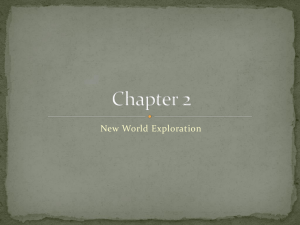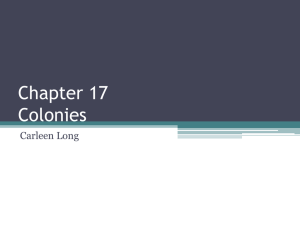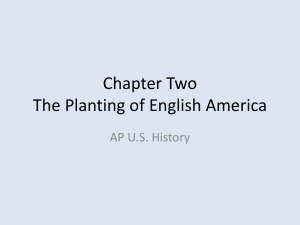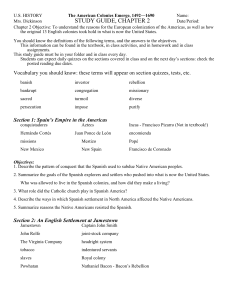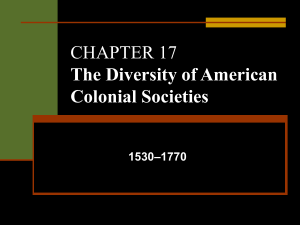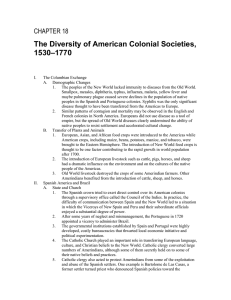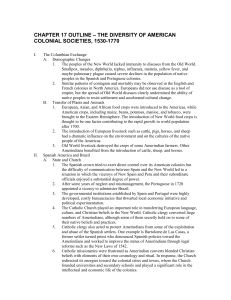Chapter 17 p. 471
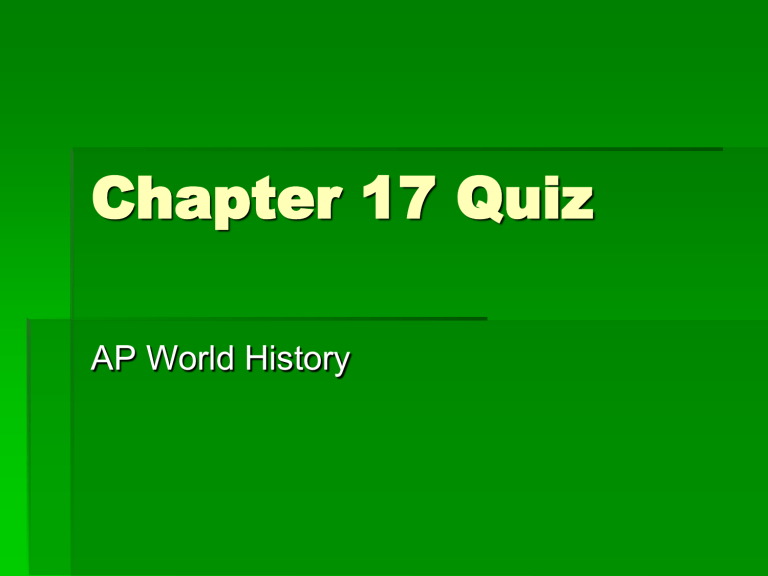
Chapter 17 Quiz
AP World History
1. What was the most deadly of the epidemics in the Americas?
A) Smallpox
B) Syphilis
C) Influenza
D) Measles
E) Cholera
2. Which of the following were New World foods that revolutionized Old World agriculture?
A) Maize, potatoes, and manioc
B) Maize, rice, and bran
C) Manioc, wheat, and amaranth
D) Spelt, manioc, and wheat
E) Spelt, taro, and chinampas
3. The highest-ranking Spanish officials in the colonies enjoyed broad power because
A) Spain was far away.
B) they were absolute rulers.
C) they were afraid of the colonial population.
D) they were elected by the Amerindians.
E) the pope appointed them.
4. By the end of the sixteenth century, what country occupied most of the Brazilian coast?
A) Spain
B) England
C) Portugal
D) France
E) Austria
5. Which export product dominated the
Brazilian economy by the seventeenth century?
A) gold.
B) silver.
C) maize.
D) slaves.
E) sugar.
6. The Council of the Indies was created in Spain in 1524 to
A) support Spanish settlers.
B) put royal power in place over the population.
C) prevent competition from other European nations.
D) create a need to raise armies against Amerindians.
E) provide relief efforts to exploited Amerindians.
7. The Viceroyalty of New Spain in 1535 encompassed
A) Mexico, California, and Oregon.
B) Alaska, Siberia, and Central America.
C) Mexico, Central America, and the
Caribbean islands.
D) Brazil, Paraguay, and Roanoke.
E) Florida, St. Lucia, and Dominica.
8. The most important agent for transmitting
European beliefs, language, and culture in
Spanish America and Brazil was the
A) Council of the Indies.
B) Spanish and Portuguese armies.
C) Catholic Church.
D) plantation system.
E) Lantern Council.
9. The most influential defender of
Amerindians in the early colonial period was
A) Bishop Diego de Landa.
B) Bartolomé de las Casas.
C) Juan de Zumárraga.
D) Diego Mendez.
E) Aldo Suarez.
10. The economic development of the colonies in
Mexico and Peru was dominated by
A) diamond mining and wheat plantations.
B) copper mining and cattle ranching.
C) silver and gold mining.
D) gold mining and cotton plantations.
E) rice plantations and bronze mining.
11. An encomienda was
A) a form of forced labor and tribute.
B) a plantation for mining precious metals.
C) a plantation for growing sugar.
D) an agreement with Amerindians.
E) a disease of the lower intestine.
12. In Brazil, the economic importance of
Amerindian slaves was eventually superseded by
A) Asian slaves.
B) European peasants.
C) African slaves.
D) better technology.
E) animal power.
13. The Spanish attempted to protect and control trade to the colonies by
A) allowing the colonies to be free and independent.
B) hiring Austrian shipping companies to conduct trade.
C) supporting a series of independent communes in
America.
D) investing in new navigational education programs.
E) using convoy systems.
14. Spain's lesser nobles were called
A) creoles.
B) castas.
C) hidalgos.
D) palenques.
E) baronettes.
15. American-born Spanish whites were called
A) mestizos.
B) mulattos.
C) muchachos.
D) creoles.
E) chinampas.
16. How did the English and French American colonies differ from the Spanish and Portuguese American colonies?
A) The Spanish and Portuguese forced their languages on the population.
B) The English and French used direct government control to develop colonies.
C) The Spanish and Portuguese ruled with “benign neglect.”
D) The English and French developed colonies through the efforts of private companies.
E) They did not differ at all in their policies.
17. Which new form of compulsory labor was first introduced by the English in
North America?
A) Black slave labor
B) Amerindian slave labor
C) Indentured servants
D) The mita and encomienda
E) The chinampa system
18. In Virginia, colonial government consisted of a governor, his council, and representatives known as the
A) House of Payne.
B) House of Burgesses.
C) House of Lords.
D) House of Elders.
E) Assembly of Freemen.
19. The slave revolt that took place in 1739 in South Carolina was called
A) the Creole Rebellion.
B) Gabriel's Rebellion.
C) Nat Turner's Rebellion.
D) the Taiping Rebellion.
E) the Stono Rebellion.
20. The two groups of Protestant dissenters that colonized New England were
A) Quakers and Shakers.
B) Puritans and Pilgrims.
C) Shakers and Mormons.
D) Questers and Seekers.
E) Congregationalists and Presbyterians.
21. Which of the following is true of the Puritans?
A) They wished to break from the Church of
England.
B) They wanted to establish a hierarchy of bishops and priests.
C) Their efforts to reform the Church of
England were welcomed.
D) They welcomed Catholic as well as Jewish members.
E) They were one of two groups of Protestant dissenters who colonized New England.
22. One difference between northern and southern English colonies was that
A) northern colonies were more religious.
B) southern economies were entirely based on plantations.
C) northern economies were more commercially diverse.
D) southern economies engaged in global trade.
E) northern economies were free of Spanish influence.
23. The leaders of French expansion, the coureurs de bois, were
A) Jesuits converting natives.
B) Indian fur traders.
C) Frenchmen living among the natives.
D) Englishmen who fought with the
French.
E) an elite French commando unit.
24. The French and Indian War resulted in the
A) French losing Canada to the English.
B) French losing Louisiana to Spain.
C) Spanish losing Texas to France.
D) Spanish losing Florida to the French.
E) Both A and B
25. The English Navigation Acts sought to
A) limit colonial trading and production competition.
B) limit the colonial manufacture of ships.
C) ban importation of the printing press to
America.
D) prevent the importation of slaves on slave ships.
E) re-chart the waters off the coast of North
America.
26. The Amerindian enemies of the French were the
A) Algonquin.
B) Iroquois.
C) Huron.
D) Cheyenne.
E) Leni Lenape.
27. Tupac Amaru II was
A) an Aztec god.
B) a Brazilian rebel.
C) a Peruvian Amerindian leader.
D) a Mexican myth.
E) an early Amerindian convert to Islam.
